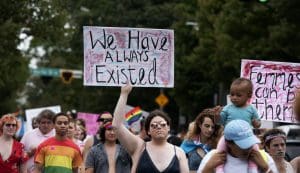Transgender people were already in danger. Then coronavirus came.
Transgender people are particularly vulnerable to COVID-19 due to the economic and social barriers they face.

The threat of COVID-19 is particularly dire for transgender Americans, who already face economic and social challenges due to discrimination.
Hundreds of thousands of transgender people are at risk for serious illness from COVID-19, partly due to financial strain and concerns about transphobia in health care, according to a Williams Institute at UCLA School of Law study released on Wednesday.
That’s why LGBTQ advocacy groups have been demanding that Congress and state governments respond accordingly.
“As in all emergencies, the most vulnerable are the most at risk during the COVID-19 crisis,” Human Rights Campaign President Alphonso David said this month.
David is asking for states to collect more data to measure the impact of COVID-19 on those most at risk so policymakers can respond with prevention and treatment strategies.
He also called on Congress to consider the impact of COVID-19 on LGBTQ people and black people in future stimulus packages. His organization said the federal government is failing to address or even acknowledge how people of color are disproportionately affected by the pandemic.
“Data is emerging showing Black communities are contracting and dying from the virus at particularly high rates, and our own research shows the economic and health impacts this pandemic may have on LGBTQ people,” David said.
This week, nearly 200 organizations, which included many national LGBTQ advocacy groups, sent a letter to Congressional leaders. It requested that they include provisions that ensure LGBTQ people are not excluded from or otherwise discriminated against in programs and services funded by federal COVID-19 response legislation.
The Williams Institute estimated that a large number of transgender people have health conditions that could put them at risk of severe illness from COVID-19.
The Centers for Disease Control and Prevention said that people who are immunocompromised, which includes people who have poorly controlled HIV or AIDS, and people with underlying medical conditions, such as lung disease serious heart conditions, diabetes, and asthma, are at higher risk for severe illness.
According to the Williams Institute study, which uses data from the U.S. Transgender Population Health Survey, 208,500 transgender adults have asthma, 81,100 have diabetes, 74,800 are living with HIV, and 72,700 have heart disease — out of 1.4 million U.S. adults who identify as transgender.
Transgender people also face health risks from the social distancing and job losses associated with the pandemic.
The Williams Institute estimates that 139,700 transgender people were out of work when the pandemic started. Job losses stemming from the pandemic could ultimately lead to worse economic circumstances for many of them.
Due to the economic precarity many transgender people face as the result of discrimination in housing and employment, as well as family rejection, many transgender people are homeless. In fact, 1 in 5 transgender people has experienced homelessness. A 2012 Williams Institute study found that of the up to 1.6 million young people who experience homelessness, 40% identify as LGBTQ.
The study also said 377,000 transgender adults reported experiencing homelessness within the past year. Many homeless people can’t regularly wash their hands, and the shelters they can go to may make it challenging to socially distance and take other measures to prevent the spread of the virus.
These economic vulnerabilities also affect transgender people’s access to health care, since 137,600 transgender adults don’t have health insurance and 450,400 transgender people haven’t gone to a doctor in the last year because they couldn’t afford to.
Transgender people’s ability to receive decent medical care is also influenced by their concerns that they will face discrimination in health care settings. The report estimates that 483,000 transgender adults feel concerned that if they express their gender, health care providers could deny them good medical care.
According to a 2017 Center for American Progress survey on discrimination in the LGBTQ community, 23.5% of transgender respondents avoided doctors’ offices in the past year, compared to 4.4% of cisgender lesbian, gay, and bisexual respondents. Twenty-seven percent of transgender workers reported being fired, not hired, or denied a promotion in the last year because of their gender.
And, according to the CDC, social isolation, financial strain, and job loss are associated with elevated risk for suicide. According to the Williams Institute, 587,100 transgender adults have attempted suicide in their lifetimes.
“We have seen the impact of #COVID19 on communities of color & now we have data to show how LGBTQ people are struggling. For those living at the intersections, it is even more profound. We must continue to push for policies that support those most impacted,” Davis said.
Published with permission of The American Independent Foundation.
Recommended

Biden campaign launches new ad focused on Affordable Care Act
Former President Trump has said he wants to do away with the popular health care law.
By Kim Lyons, Pennsylvania Capital-Star - May 08, 2024
Ohio doctors fear effects of emergency abortion care case set to go before U.S. Supreme Court
A federal law that allows emergency departments to treat patients without regard to their ability to pay will be under U.S. Supreme Court scrutiny this week, and Ohio doctors are concerned about the case’s local impact on emergency abortion care.
By Susan Tebben, Ohio Capital Journal - April 23, 2024
House GOP votes to end flu, whooping cough vaccine rules for foster and adoptive families
A bill to eliminate flu and whooping cough vaccine requirements for adoptive and foster families caring for babies and medically fragile kids is heading to the governor’s desk.
By Anita Wadhwani, Tennessee Lookout - March 26, 2024












































































